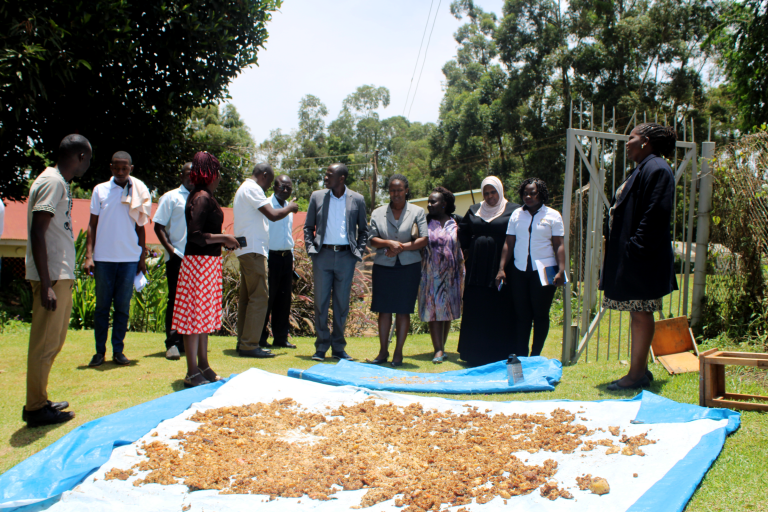By Irene Best Nyapendi
The Uganda Christian University (UCU) Faculty of Agricultural Sciences has teamed up with crickets – the insect and not the sport – in a successfully piloted food chain project that alleviates hunger and malnutrition. The ‘Food Waste-2-Cricket Feed’ enterprise produces cricket feed from food waste and then turns the insects into a nutritious food supplement.
The UCU agriculture research team, led by Geoffrey Ssepuuya, a senior lecturer, established that there is a daily production of 768 metric tons of food waste in Kampala.

The project aimed at developing a processing protocol for converting food waste to a safe and shelf-stable cricket feed. It was funded by the Uganda National Council for Science and Technology (UNCST). Florence Agwang, the grants officer at UNCST, says the undertaking was especially viable because the country has long struggled with waste management.
“If this project succeeds and is able to get support from the government, we shall be able to greatly reduce the problem of waste in Uganda,” Agwang says.
The project involves collecting food waste from the UCU university dining hall in addition to remains from restaurants, hotels and markets.
Collected food waste such as bananas, rice, etc. is heat treated, dried, ground into powder and mixed according to predetermined formulation proportions into feed for the crickets. The crickets are reared in aerated food containers and provided with hide-outs because the crickets are nocturnal (comfortable in dark places).
In a bid to ensure sustainable cricket production in the country, the project is working towards continued production and distribution of this low cost “protein and micro–nutrient rich cricket feed.” The developed cricket feed is nutritious with a performance similar to that of broiler starter mash. With the formulated feeds, the crickets require 8 – 10 weeks to mature, while with local feeds, crickets take about 12 weeks to mature.
Crickets can be used to enrich the diet with protein and other nutrients when added to the daily meals. It is a common practice in Uganda to eat fried insects such as crickets and grasshoppers. In this project, crickets, which have more protein than fish and beef, are ground to be mixed with staple flours for porridge and food.

“Instead of consuming cassava bread that is only about 2% protein or even less, communities can supplement it with crickets which are 50 – 65 % rich in proteins,” Ssepuuya says. “So, with the feeds now available they can rear the crickets, dry them under the sun, grind them into powder and add the protein rich powder to their food.”
The most common sources of proteins such as meat, milk and chicken are not affordable to many Ugandans, yet it can now be redeemed from eating crickets.
Dr. John Livingstone Mutyaba, Head of Agriculture (Postgraduate), explained that rearing crickets can be a new source of income for farmers through rearing and selling them. Crickets (Acheta domesticus) lay hundreds of eggs, which makes them multiply in a very short time.
Mutyaba says unlike what some commonly believe, crickets are not demanding in terms of housing and food.
The biggest challenge is feed in addition to proper management of heat and humidity. This is because crickets are more comfortable in dark places, and during cold days, they need heat.
There also is a need for labor and sufficient space to dry the crickets when they reach maturity. This is because they are best when dried before consumption.

The project is also supporting research by students like Derrick Kizito Okettayot, a fourth-year student of Food Science and Technology. To Okettayot, crickets are a delicacy.
“When I was young, we used to pick a few crickets hiding under the grass, roast and eat them,” Okettayot recalls. “I used to eat them in small quantities because they were rare, but I am so glad that I have now learned how to rear crickets, and I can now have enough of them.”
He adds that one can even blend crickets with fruits to make a protein shake.
“This is a win-win solution when we use food waste to feed the crickets and later feed on the crickets, so the food waste comes back to us in a different format to benefit us and the insects,” Dr. Rose Mary Bulyaba, the dean of the Faculty of Agricultural Science says.


